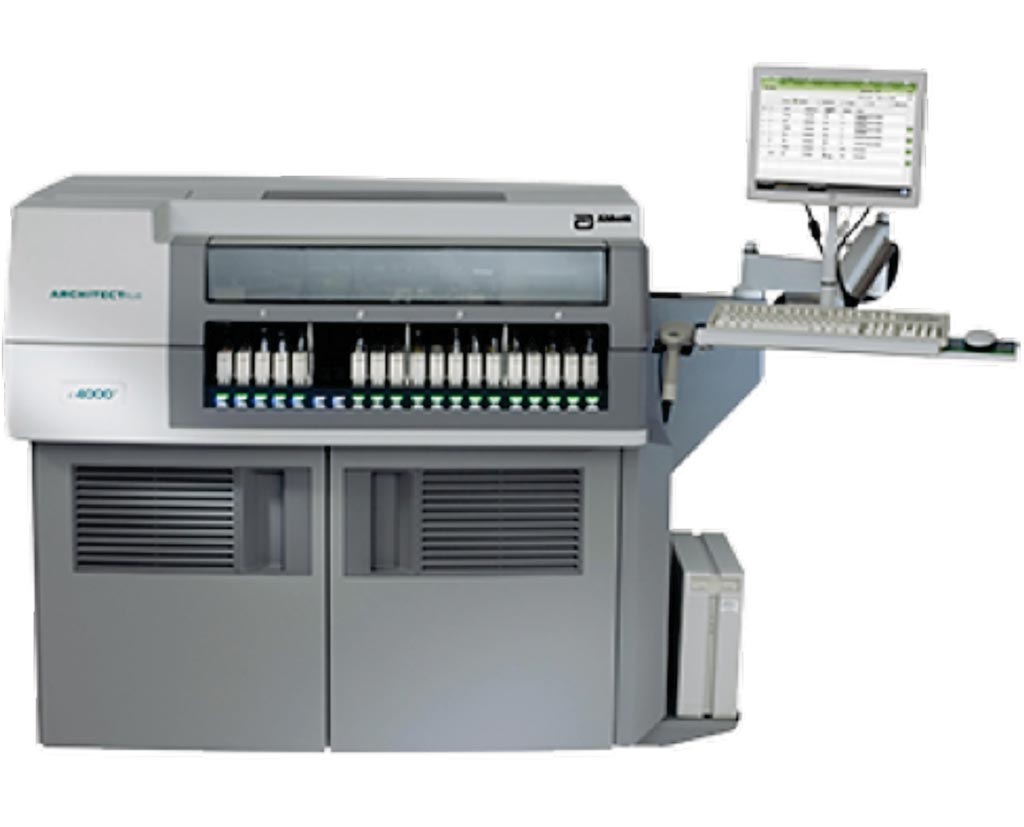Blood Test Predicts Silent Heart Disease Risk
By LabMedica International staff writers
Posted on 19 Jan 2017
Coronary heart disease is the UK's single biggest killer, accounting for nearly 70,000 deaths in the UK each year. When heart muscle is damaged it leaks a protein called troponin in to the blood stream. Patients suspected of suffering a heart attack will often be given a troponin test to aide diagnosis, but until now the test has not been used to assess future heart attack risk.Posted on 19 Jan 2017
Cardiac troponin is an independent predictor of cardiovascular mortality in individuals without symptoms or signs of cardiovascular disease. The mechanisms for this association are uncertain, and a role for troponin testing in the prevention of coronary heart disease has yet to be established.

Image: The ARCHITECT C4000 chemical analyzer (Photo courtesy of Abbott Laboratories).
Scientists at the University of Edinburgh and their colleagues studied 6,595 men ages 45 to 64 years with moderate hypercholesterolemia (Low-density lipoprotein (LDL) cholesterol concentrations 152 to 228 mg/dL) and no prior history of myocardial infarction to receive placebo or pravastatin 40 mg/day. Plasma was obtained before randomization and at one year, and was stored at –80 °C. For the analysis, they identified all participants with sufficient stored plasma at both time points and as a result, 3,318 of the 6,595 study participants were included.
Cardiac troponin I concentrations in stored plasma were determined at baseline and at one year using the ARCHITECT STAT high-sensitive troponin I assay. The limit of detection is 1.2 ng/L, and the interassay coefficient of variation is less than 10% at 4.7 ng/L. The upper reference limit or 99th-centile value is 34 ng/L in men. All samples underwent centrifugation twice (3,000 relative centrifugal force for 10 minutes) to ensure samples were visibly homogeneous.
The team found that changes in blood levels of a high-sensitivity troponin test from Abbott Diagnostics accurately predicted the risk of a person suffering a heart attack or dying of coronary heart disease up to 15 years later. Troponin improved the prediction of coronary heart disease risk adding to traditional markers, such as cholesterol levels and blood pressure. If borne out in larger, more diverse, studies, doctors may be able to use the troponin test to determine which patients are most likely to develop coronary heart disease.
Those whose troponin levels decreased the most had a 5-fold lower risk of heart attack or death from coronary heart disease compared with those who troponin levels were unchanged or increased. A decrease in troponin could indicate statin treatment is effective, whereas any increases in blood troponin could prompt a change in treatment strategy. Nicholas L. Mills, MD, a professor of Cardiology and senior author of the study, said, “While blood cholesterol levels and blood pressure are important and associated with the risk of developing heart disease, troponin is a direct measure of injury to the heart. Troponin testing will help doctors to identify apparently healthy individuals who have silent heart disease so we can target preventative treatments to those who are likely to benefit most.” The study was published on December 19, 2016, in the Journal of the American College of Cardiology.













